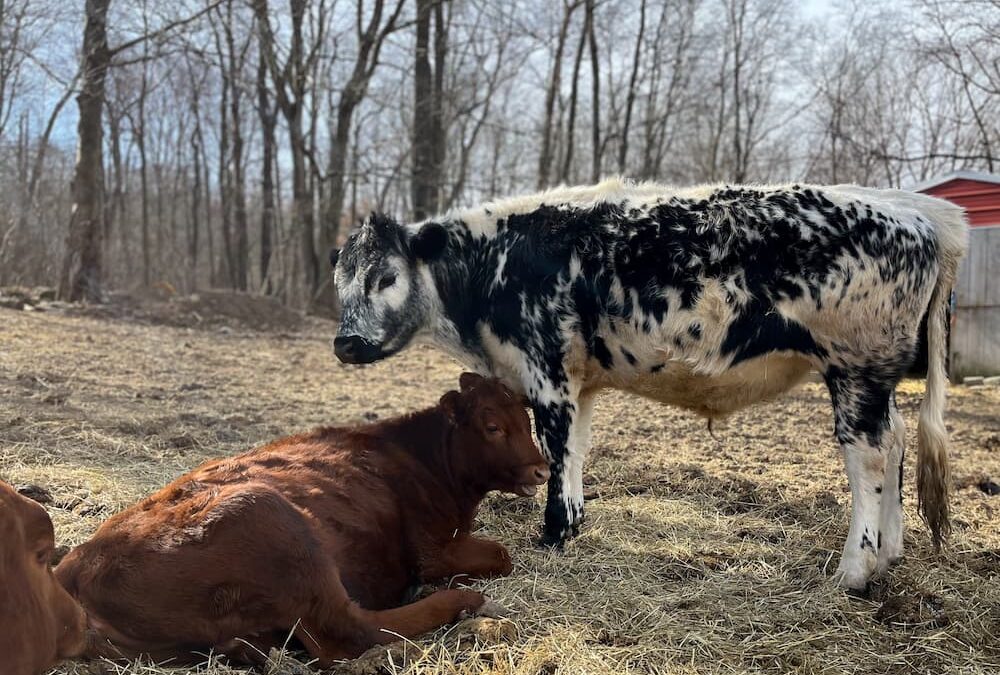Winter is here, and it’s imperative that livestock owners understand the challenges and take necessary precautions for animal health during the upcoming colder months. This blog will cover essential topics such as providing optimal winter housing for sheep, goats, and avians, managing density, preventing predators from affecting livestock, and impaction colic.
Winter Housing for Cattle, Sheep and Goats: Balancing Warmth, Ventilation, and Dryness
Sheep and goats need shelter that protects them from harsh weather while ensuring adequate ventilation to prevent respiratory issues. The housing should also be dry, as wet conditions increase the risk of pneumonia and foot disorders.
Design Considerations:
Use heavy-duty materials for insulation and wind protection. Opt for a well-drained, slightly elevated location with adequate airflow. Ensure proper ventilation with open windows or vents placed high on walls.
Consider using bedding such as straw or wood shavings to provide warmth and a dry surface for animals to rest on.
Managing Animal Density:
Overcrowding can lead to wet conditions due to excessive manure and urine production, promoting bacteria growth that may cause infections. Additionally, it’s crucial to monitor bedding conditions closely. Allowing bedding to accumulate excessively can lead to the formation of a ‘bed pack,’ which traps heat and moisture. This environment becomes a breeding ground for bacteria and parasites, significantly elevating the risk of various health issues in livestock. Such conditions make animals more susceptible to bacterial infections, pneumonia, hoof problems, and increased burdens of parasites. Regular cleaning and bedding management are essential to maintaining a healthy living space and prevent these health risks.
Keeping Chickens Healthy During Winter: A Checklist
For our avian friends, winter brings its own set of challenges to their health and comfort. Taking a few precautions can make a significant difference in their well-being.
Winter Tips:
- Provide a draft-free coop with proper insulation and ventilation
- Keep the coop clean and dry, replacing bedding regularly
- Use a heated water source to prevent frozen water
- Increase feed intake
- Check for signs of frostbite on feet and wattles regularly and seek treatment if necessary
Predator Protection
For all species, predator awareness is crucial in winter. Hungry wildlife may be more aggressive in search of food, and snow can provide access to animals not typically able to reach your livestock.
Tips for Predator Protection:
- Install motion-activated lights and alarms near housing areas
- Keep feed storage secure
- Use fencing suited to the size of predators in the area
- For chickens, ducks and other avians, install predator-proof coops to keep them safe.
Impaction Colic in Horses: A Winter Concern
Definition and Causes:
Impaction colic, a common issue in horses during winter, is a blockage in the intestines caused by dry, poorly digested feed material or even non-food material such as sand . The risk increases in cold weather due to reduced water intake and changes in diet or exercise.
Preventive Measures:
Ensure constant access to fresh water, encourage regular exercise, and provide a diet rich in fiber. Consider heated water sources to encourage drinking and maintain regular feeding schedules.
According to Michigan State University, mature horses should consume at least 10-15 gallons of clean, fresh water daily. Adequate water intake not only prevents dehydration in horses but also keeps their feed moist, reducing the risk of impaction colic. Additionally, ensuring the availability of salt or top dressing loose salt on grain usually encourages horses to drink.
Winter presents unique challenges for livestock health and well-being. By understanding and addressing the specific needs of horses, sheep, goats, and avians, you can ensure their safety and health during the cold season. Remember, prevention is key, and a little extra attention during these months goes a long way in maintaining the health of your animals.
For more detailed information on livestock care and veterinary services, feel free to contact Tri-State Veterinary Services to schedule a farm visit.
Image credit: Ben Shebeeb / Unsplash

